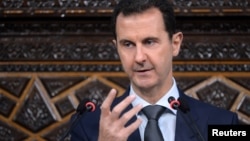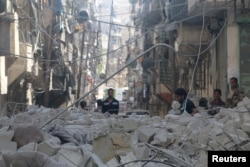Syrian President Bashar al-Assad on Tuesday reiterated his pledge to defeat Islamic terrorists and their supporters and to quash what he claims are the destabilizing goals of neighboring Turkey.
In an address to the country’s newly elected parliament Tuesday, Assad accused Turkish President Recep Tayyip Erdogan of aiding the Islamic State. The Syrian leader said Aleppo – his country’s largest city and a chief battleground – would become a "graveyard" for Erdogan’s dreams.
Assad also repeated previous vows that his forces would "liberate every inch of Syria," claiming such a victory was the "only option." He went on to thank allies Russia, China, Iran and Lebanon’s Hezbollah militia for their support.
Charges of foreign meddling
Assad repeatedly has accused other regional and international powers of trying to dismantle his country by playing one religious sect off another. He claims that outside powers want to impose an ethnic and sectarian constitution on the country, trying to turn natives into rivals and enemies and prepare the way for a possible division of Syria.
He said sectarian regimes fail because they pit one community against another and encourage alliances with outside parties.
The Syrian president went on to accuse alleged foreign "enemies" of working to destroy the country’s institutions, including its military, and to undermine its national currency and economy.
But Khattar Abou Diab, who teaches political science at the University of Paris, told VOA he thought Assad himself was responsible for "destroying the army and the country’s infrastructure." Diab said that, since the conflict’s outset in 2011, the Syrian president has been “seeking a military solution, using violence and repression.”
Blaming United States
Assad blamed the United States for unraveling of the cease-fire agreement between government forces and rebel fighters, which went into effect in late February. He claimed the U.S., which worked with Russia to broker the deal, was "unable to force its allies to observe its conditions." That included a temporary truce and the ability to deliver humanitarian aid to besieged areas.
Gulf-based analyst Theodore Karasik says that without the "vigorous support" of allies Moscow or Tehran, Assad would "not have rejected the Geneva III process," nor would he have "threatened Turkey's president by name" in his speech before parliament. Assad, he argues, has now "opened the next chapter of the disaster known as Syria," based on the "difference in definition" over which belligerents are "terrorists" and extremists.
The Syrian president appeared to distance himself from the recent U.N.-sponsored peace negotiations in Geneva, insisting his government had only agreed to talk to U.N. mediator Stefan de Mistura and not to invited opposition forces. The peace talks faltered in April.





